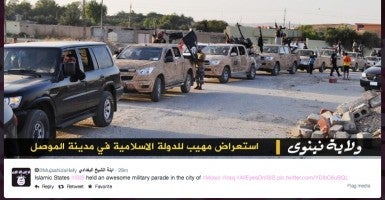Social media sites are the latest battleground in the war on terror. On June 20, the Sunni terrorist group ISIS, which is on a rampage in northern Syria and Iraq, launched a Twitterstorm under the hashtag #AllEyesOnIsis. It was aimed to appeal to impressionable Muslim youth, scare ISIS’s enemies on the ground., and intimidate the rest of the world.
This is Propaganda 101. By some accounts, ISIS is becoming addicted to Twitter and is even receiving tweets of support with photos of everything from bloody limbs to pink cupcakes with “ISIS we love you.”
Sadly, Twitter’s comment about this appalling use of the social media website was that you “have to take the good with the bad.” This is moral equivalence at a new low: Just consider ISIS’s propensity for extreme violence against Christians and other Muslims alike, which it proudly posts on the Internet for the world to see.
Beyond lamenting ISIS’s use of twitter, what should we do? It’s clear that combating a new generation of terrorists, who are as adept at photoshopping ad graphic design as they are at executing unarmed soldiers and setting fire to churches full of worshippers, requires special skills and tools on the part of governments. The Iraqi government has tried to shut down social media in the country but has discovered that the Internet at this point is far too porous to allow a blackout.
From an American perspective, fighting the ISIS propaganda war means exposing the groups and their violent embrace of tyranny — something that is already common terrain for the parts of the U.S. government that deal in counterterrorism communication. Equally important, the U.S. has a huge advantage as the world’s high-tech innovator.From the National Counterterrorism Center to the State Department’s Center for Strategic Counterterrorism Communication, the United States has developed considerable capacity to use Internet messaging to counter terrorist propaganda. Another tool in this box is the Internet Anti–Censorship Division of the Broadcasting Board of Governors, which has developed considerable technical expertise working to counter government censorship in places such as Cuba and China.
Fighting ISIS propaganda is only one aspect of combating this most recent terrorist menace, one that we have to tackle head on.































